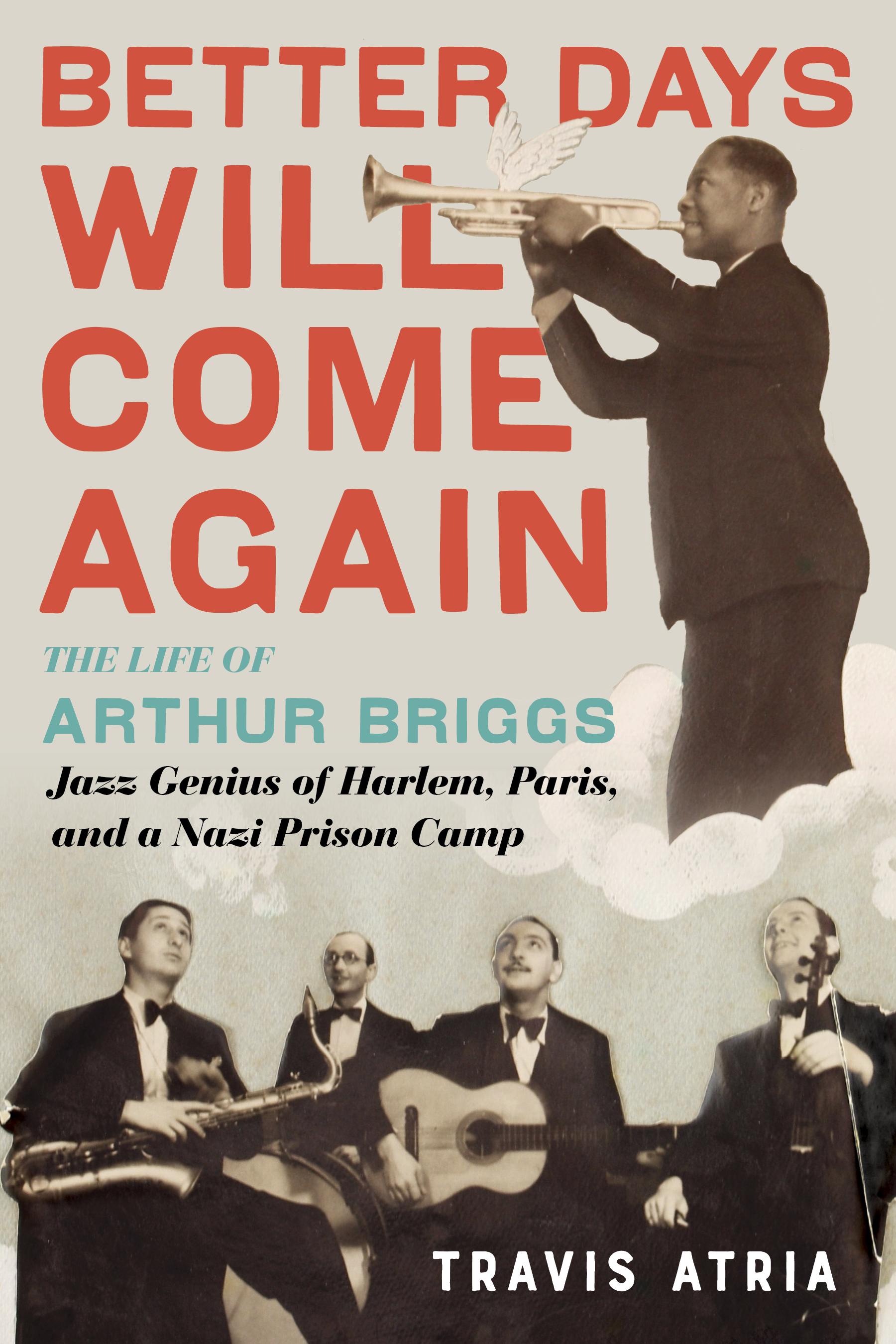 Better Days Will Come Again by Travis Atria tells the true story of Arthur Briggs, whose life was a whirlwind of music, triumph, and tragedy. During the legendary Jazz Age in Paris, Briggs’s trumpet provided the soundtrack to the Lost Generation. By the 1930s, Briggs was considered “the Louis Armstrong of Paris,” and was the peer of the greatest names of his time, from Josephine Baker to Django Reinhardt. He did not, however, heed warnings to leave Paris before it fell to the Nazis, and in 1940, he was arrested and sent to the prison camp at Saint Denis. What happened at that camp, and the role Briggs played in it, is truly unforgettable.
Better Days Will Come Again by Travis Atria tells the true story of Arthur Briggs, whose life was a whirlwind of music, triumph, and tragedy. During the legendary Jazz Age in Paris, Briggs’s trumpet provided the soundtrack to the Lost Generation. By the 1930s, Briggs was considered “the Louis Armstrong of Paris,” and was the peer of the greatest names of his time, from Josephine Baker to Django Reinhardt. He did not, however, heed warnings to leave Paris before it fell to the Nazis, and in 1940, he was arrested and sent to the prison camp at Saint Denis. What happened at that camp, and the role Briggs played in it, is truly unforgettable.
Author Travis Atria’s groundbreaking research helps bring unprecedented access to Briggs’s oral memoir, a crucial document of jazz history, resulting in a fast-paced epic and entirely original tale of survival.
The book published this month, so we asked him to write a blog post about the music he consumed to help him get into the swing of things (pun intended) and write this riveting biography of an unsung hero.
_______
Writing about music is like dancing about architecture, or so the saying goes. I think about this adage most days, because most days I write about music. And I agree—it is silly to write about something that refuses description. An entire library of words about music is nothing compared to ten seconds of listening to the stuff. And yet, I have spent the better part of the last fifteen years writing words about music.
In this writing I often attempt to describe the sound of music, but I much prefer trying to capture its feel. I want the rhythm of the music to enter the words on the page. I don’t know if this is possible, but still I try.
I go about it in two ways.
First, I listen to the music of the era that I am writing about. For Better Days Will Come Again, I started off with ragtime. I listened to Scott Joplin’s “Maple Leaf Rag,” and of course, “The Entertainer.” I listened to the early jazz greats who influenced Briggs as a teenager. My favorite was Briggs’s close friend Sidney Bechet, but I also spent a lot of time with Louis Armstrong and his Hot Five and Hot Seven recordings, because Briggs was a trumpeter, and even he admitted Armstrong’s supremacy. “West End Blues” is probably the most famous of these, and it is quite nice to set a pace for writing.
As jazz progressed, I progressed with it. I listened to a lot of Duke Ellington’s “East St. Louis Toddle-Oo,” a song that heavily influenced Briggs. I also immersed myself in Brigg’s own recordings, which he began making around the time of Ellington’s masterpiece. I especially loved writing to his excellent work with the Harlemites, such as “Foxy and Grapesy,” “Harlem Bound,” and “Sweet Georgia Brown,” as well as his work with Django Reinhardt, including “Scatterbrain” and “Avalon.”
These I consider period pieces—something to give the click-clack of the keyboard an appropriate rhythm. I did the same thing with Traveling Soul, listening to the music that influenced Curtis Mayfield as he grew up, and later listening to his music. But what I find more helpful is music that puts me in a mood. What I’m looking for is a sort of trance state, and I find that jazz is the best music for this.
During the writing of Better Days, I listened to one album in particular on repeat: Miles Davis’s Big Fun. Recorded in 1972, it is a challenging album, in line with his famously arcane Bitches Brew, but for my money, much nicer to write to. It has everything I want in a writing album—it is long, so I can stay in the trance for a good while. It gets into the subconscious and keeps it busy, allowing me to connect freely with whatever part of the mind handles writing. And, because it is so formless, I can put it on repeat endlessly without tiring my ear.
In fact, the great thing about writing to Big Fun is also what makes it hard to write about Big Fun. There’s no specific song I can point to and say this is the one. It must be experienced as a whole. You’ll never find yourself whistling a melody like “Freddie Freeloader” or “So What,” but that’s precisely why it is perfect. On Big Fun, Davis captured the protean nature of creativity. The album is nebulous in every sense of the word. It is vague and hazy, a formless mass waiting to produce something beautiful, and sometimes getting near it, only to retreat back into formlessness.
The night before I turned in Better Days, I stayed up until 4:00 am in a marathon of delirious editing, and Big Fun stayed up with me. I worked myself into a state I’d never known. I felt some sort of cosmic connection with the words on the page. Normally, I agonize over editing. That night, with Miles’s help, I could see everything. I felt peace as I hacked away at the manuscript.
I could’ve flipped the record forever.
1 Comment
Travis you are an amazing writer and story teller.
Love the book!